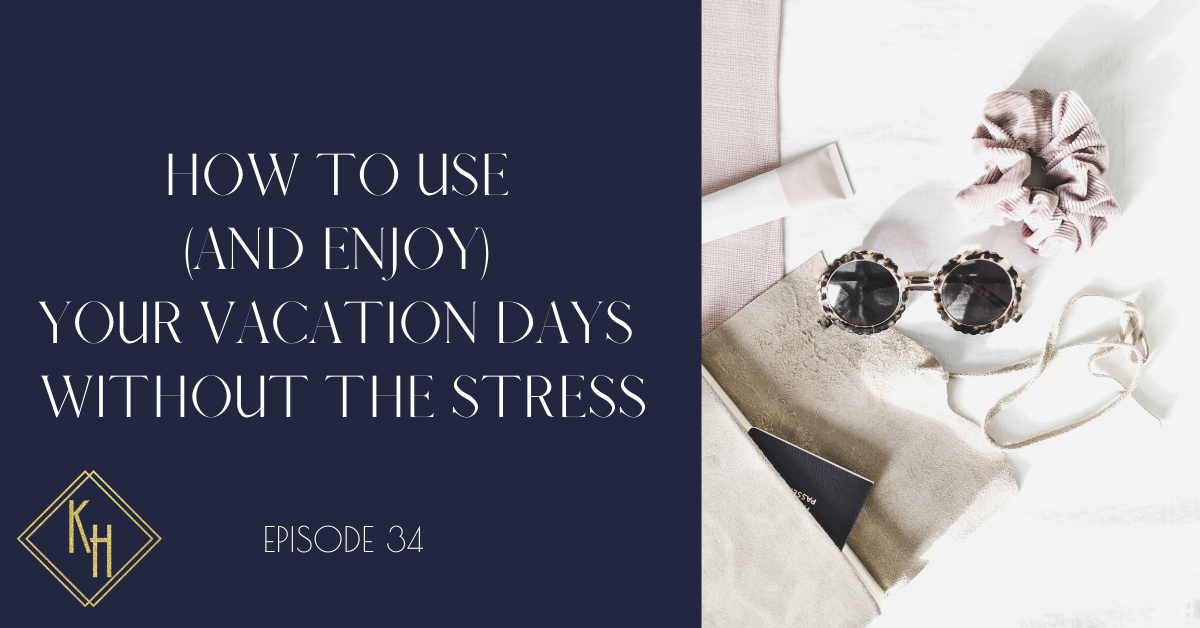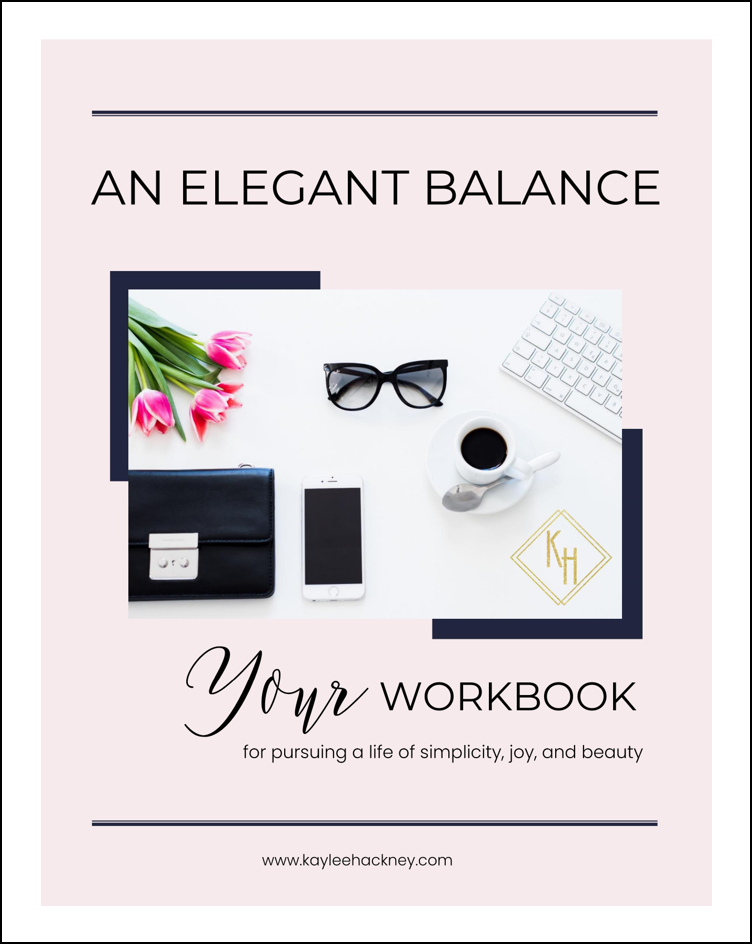How to Use (and Enjoy) Your Vacation Days without the Stress
Prefer to listen?
The holidays are drawing near. It’s hard to believe that Christmas is less than 2 weeks away! As we approach the holidays, I thought it would be fitting to talk about how to take time off well. I know I’m guilty of it; and many working moms I’ve talked to have expressed the same sentiments: It’s hard to truly and fully step away from work. And yet, stepping away from work to spend time on the things that truly matter to us is vital. I want each and every one of you to lead lives filled with joy and that’s hard to do when you’re working 24/7.
We’re not alone in feeling like vacations are hard to squeeze into our busy lives.
Studies show that only 68% of employees actually use all of their paid vacation days; which employees in the US tend to only receive 10 days to begin with. Even crazier still is that despite the fact that employers are offering more paid time off than ever before, employees are actually using less of it. Between 1976 and 2000, the average American took approximately 20 paid days off. Today, that average has dropped to 17 days.
But why?
Why don’t employees take time off? Why don’t you and I take time off?
Want to start creating your ideal work-life balance?
I’ve created this workbook just for you! Inside, I help you define what work-life balance looks like for you and share some tips on creating that balance.
You can get it by clicking the button below!
Some recent research examined three reasons why we tend to leave vacation days on the table. First, we might lack of confidence in our ability to fully detach from work while taking a vacation. Second, we might expect negative outcomes, such as a vacation being too expensive. And third, we might not expect positive outcomes, such as being able to truly relax. In this study, employees who held these beliefs were less likely to fully utilize their vacation days.
Another reason we might not use our vacation days is something that us working moms are all too familiar with… guilt. Several industry reports have highlighted the role that employees’ guilt plays in their decision to take (or not take) time off. Not surprisingly, one report found that female employees were more likely to cite guilt as a reason to not use their vacation days – 25% of female employees vs. 20% of male employees. These feelings of guilt likely stem from feeling as though taking time off violates workplace norms. In other words, if you work in an organization where the culture is one of constant connectivity and availability, you might feel like you can’t use your time off because taking that break will cause you to be viewed as less committed or less hardworking by your supervisors and coworkers.
Reasons why we should use our vacation days:
Despite all this evidence (and maybe even some personal experiences), there is a vast amount of research in support of taking vacation and using that paid time off. Constantly dealing with work-demands and stressors can take a toll on our bodies and lead to diminished health and well-being. Vacations give us a chance to take a step back and they are linked to short-term increases in life satisfaction and decreases in exhaustion and physical health complaints. Not to get too dramatic but taking advantage of your paid time off could even save your life. One study found that female employees who took fewer vacations were more at risk of heart attacks and cardiac death.
Other benefits of taking vacation include increased resilience, better perspective on work and life, and increased creativity in how you approach work problems.
Have I convinced you to take a vacation yet?
If so, we simply need to address those concerns I laid out a few minutes ago. We need to become more confident in our ability to truly detach, release any fears about negative consequences, and mindfully embrace the positive outcomes that a vacation could have for us and our families. In preparing for this episode, I scoured the internet and read half a dozen Harvard Business Review articles so that I could provide you with some vacationing best practices. Here we go:
How to best prepare for a vacation:
1. Plan ahead
The first step to preparing well for some much-needed time off is to make a plan. If you’ve been following me for long, you know that I love planning. And I love it because it is so impactful in moving our lives in the direction we want them to go. Now, this might be a bit difficult for the upcoming holiday (since we are only a few weeks away), but once you decide you want to use some of your vacation days put it on the calendar. Make a plan for it. You’ll be much more likely to follow through if you’ve planned to take that time off than if you leave it up to the spur of the moment.
2. Prioritize
Next, you want to make time a few weeks before your scheduled time off to take a look at your workload and get clear on your priorities. Which items absolutely need to be done before you leave? Make a list of the prioritized tasks and show it to your manager to get their feedback. Then, stick to your priorities! Deviating from them will only result in feeling frazzled and overwhelmed when it comes time to actually leaving the office.
3. Delegate
Make sure that you let your boss and coworkers know that you plan to be out of the office, and not only that you’ll be gone but also that you’ll be unplugged. Depending on your job, it might make sense to find a person (or two) who can handle anything that might come up while you are gone. It could also be helpful to nominate someone who will contact you in the case of an emergency. This means that you can better unplug during your time off and ignore all emails/messages unless they come from this one person. Knowing that nothing is going to fall through the cracks while you’re away will go a long way in helping you truly relax during your vacation.
4. Straighten Up
Seems simple and maybe even silly, but having a nice and neat office to return to will work wonders in easing you back into work. My husband and I have been practicing this for a long time. Every time we travel we clean the house top to bottom; wash the laundry; clean the toilets; mop the floors. It is amazing to come home from a long trip to absolutely no chores. The same thing works for your office space. As a professor, I like to deep clean my office before every summer break. It might feel like a waste of time when you are preparing to leave, but your future, fully-relaxed post vacation self will thank you.
5. Communicate
Finally, set up an “out of office” automatic email response. Depending on your company culture, you could get quite creative with these. The ones I like best indicate that 1) you are out of office, 2) you are unplugged, 3) include specific dates, 4) provide a contact person in case of emergency, and 5) instruct contacts to reach back out after your return date. This last part is key – it means that you don’t really need to check all your unread emails upon returning. If it’s important enough, they will reach back out at a later date.
How to best enjoy a vacation:
1. Get clear on your intentions
A quick way to ruin a vacation is to go in without any idea of what you want to get out of it. Is this vacation supposed to be a time of rest and relaxation? Is the focus on spending time with your kids? Or are you aiming to gain a new experience or adventure? It can be more than one thing, but the idea is that you identify it, anticipate it, and be mindful of it throughout the vacation. Not only will this give you guidance on which activities to say yes to while on vacation, but it will also help you be more satisfied with your vacation after it’s over because you know it met your expectations.
2. Unplug
Technology is great, until it isn’t. It is so hard to fully step away from the world of work when we can be constantly connected no matter where we go. Unplugging, and I mean fully unplugging, is one of the best things you can do during your vacation. Last winter we went skiing and I made a point to not turn on my phone or laptop unless absolutely necessary and it was amazing. It was almost as though time stood still. I couldn’t believe how much more relaxed I was and how many fun things we were able to squeeze into each day. If you’re not able to fully unplug, at least set boundaries around it. For example, you could tell yourself that you are going to work from 8-10 each morning but put the gadgets down the rest of the day.
3. Be mindful
I’ve mentioned before how practicing mindfulness can make it feel like time slows down. And who doesn’t want to make their vacation last as long as possible? Take notice of the smells around you (e.g., fir trees, cinnamon, & peppermint). Pay attention to the sounds (e.g., children laughing, jingle bells, & packages being torn open). Consider the tastes of your vacation (e.g., spiced wine, baked ham, & candy canes). Embrace the sensations of the sharp winter breeze on your face (or the warm breeze off the beach), the feeling of laughing so hard it hurts. Making mental notes of these things helps our brain create beautiful memories of this vacation and can leave us feeling like we truly escaped.
4. Get away
Although staycations are much less expensive, do your best to get away. When you stay home, you don’t escape the chores around your house. Further, you are visually reminded by certain spaces (e.g., a home office) that you could be working instead. This is particularly difficult in light of the pandemic with so many of us working from home. If you absolutely can’t go anywhere, at least try to minimize the reminders and make a point to get out either in nature or to enjoy somewhere in your local city that you wouldn’t typically go.
How to ease back into work:
1. Make (another) plan
I like to do this the day before I return to work or even on the first day back. Consider what’s on your plate this week. Take a few minutes to touch base with your supervisor or coworkers who were covering for you. Thank them and ask them if there is anything you need to take care of. Also, check your email to see if anything important needs addressed. Again, if you set up your “out of office” message correctly, you shouldn’t need to worry too much about the emails you missed. Having a plan of attack is so helpful in easing back into work after some time away.
2. Reset your priorities
Before you jump headfirst into work, take some time to reevaluate your priorities. Vacations are great at putting things in perspective. It could be that some of the things you thought were priorities a few weeks ago, truly just aren’t that important. Make a list of the tasks that absolutely need to be done and the tasks which are simply things you’d like to do and stick to that.
3. Schedule that next vacation.
Friends, I hope this episode was helpful and that it inspires you to fully embrace your time off this holiday season (or on your next vacation). If you enjoyed this episode, would you consider leaving a 5-star rating and review in Apple podcasts? I read each and every one of those reviews and they truly warm my heart each time a new one comes in. Also, if you think some of your friends might benefit from this episode, please share it with them! You can text them the link or take a screen shot of this podcast and share it to your Instagram or Facebook stories. I would love to reach more women with this message of a simple, beautiful, and joy filled life.
Happy holidays friends!
The above tips were based on my reading the following articles. If you are interested in learning more about vacation, I encourage you to check them out!
How to minimize stress before, during, and after your vacation
How to take the stress out of taking time off
Thinking of skipping vacation? Don’t!
Emailing while you’re on vacation is a quick way to ruin company culture
We all really need a vacation. Here’s how to make the most of it
Is a better work-life balance one of your goals this year?
I’ve created a workbook just for you!
If you’re interested in creating a work-life balance characterized by simplicity, joy, and beauty, why don’t you start by checking out my Elegant Balance Workbook? In it, I help you define what work-life balance looks like for you and share some tips on creating that balance. I’ve said it before, and I’ll keep saying it – Balance doesn’t happen by accident.















Sharing this with you makes me smile – I love thinking back to the girl who felt confident and beautiful in that rainbow shirt and the girl who refused to attend her college classes in baggy t-shirts and Ugg boots and instead opted for a sequined top. Because despite what I think about those choices now, in each of those seasons I was intentionally using personal style to my advantage.